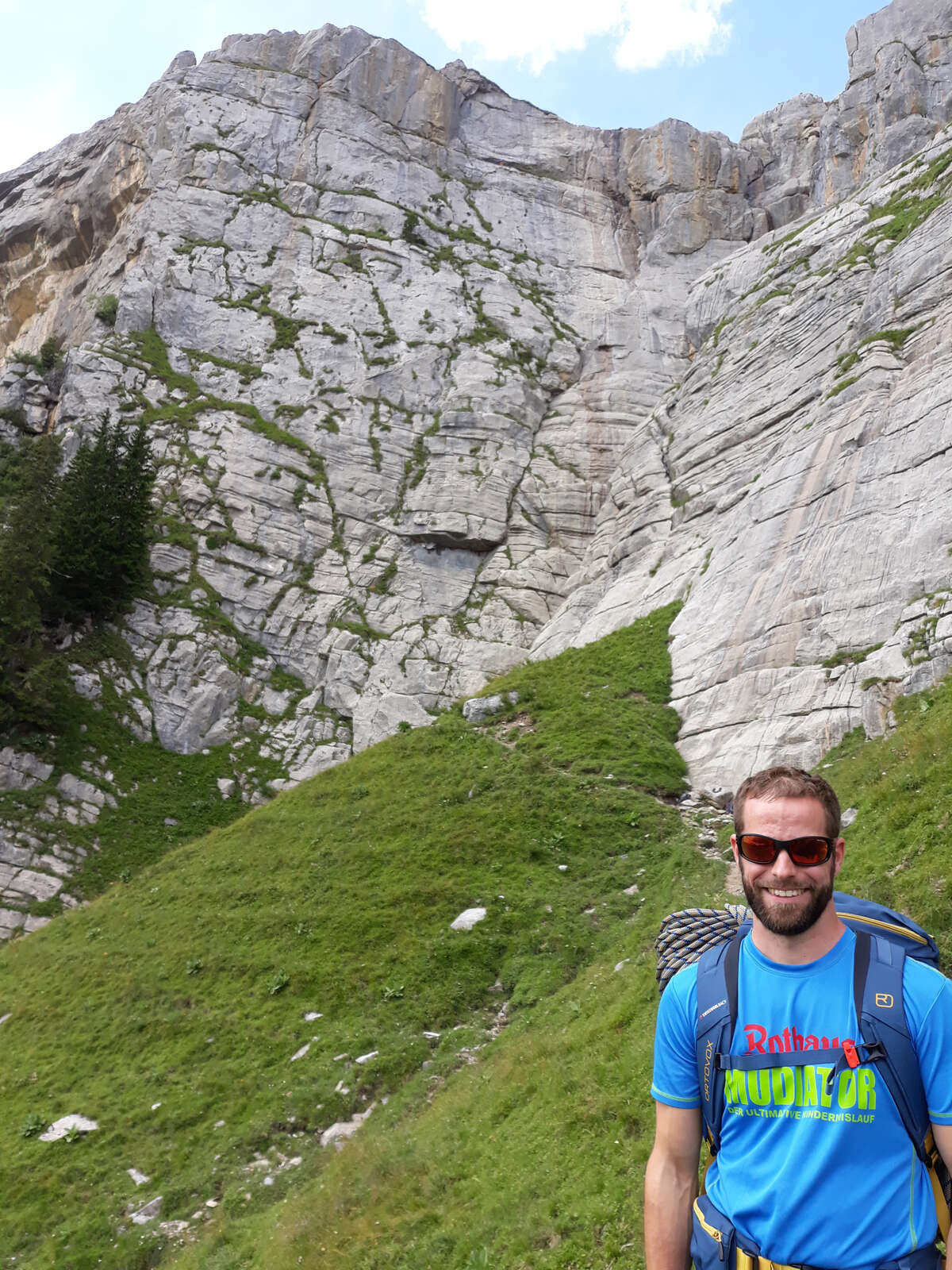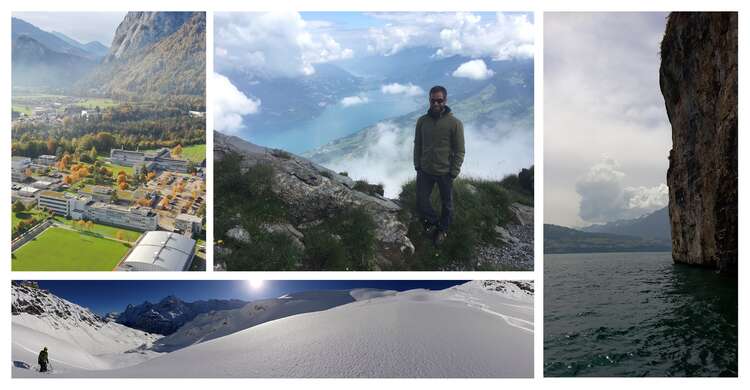On a peace mission: From NBC protection to arms control
May 2020
Whether anthrax, smallpox, Ebola, Hanta or coronaviruses – none of these are exotic to the Biozentrum alumnus Max Brackmann. He works as a postdoc at the Spiez Laboratory, which deals with NBC protection, the defense against nuclear, biological and chemical hazards. In this interview he talks about his work with dangerous pathogens, chemical weapons and about his new position, in which he will work closely together with international organizations such as the UN.
More than two years ago you started as a postdoc at the Spiez Laboratory. Did you apply for the position in the regular way?
No, it was anything but a classical job application. I met my current boss at a Biozentrum PhD Retreat. I presented a trial talk of my thesis defense presentation and he was invited as an external speaker. It seems that my talk must have had quite an impact on him. After having a lunch together followed by two interviews, it was settled. Amazing that it turned out that way.
So, you began there straight after completing your PhD at the Biozentrum. What was it like at the start?
Here, it’s a completely different world. I moved from the Biozentrum, which is very international and where many young people do research, to an environment where many of the employees are from Bern and, above all, have families. That took some adjustment on my part. From my PhD years, I was outfitted with the skills I needed to start in the Bacteriology group. And yet, it was like a new start, as being now in the Proteomics, Bioinformatics and Toxins group, my main focus lies in the development of new methods in the field of mass spectrometry and proteomics.

The Spiez Lab is a Swiss federal laboratory. In what way is it special?
The Spiez Lab reports directly to the Federal Office for Civil Protection, which is part of the Federal Department of Defense, Civil protection and Sport. Our main role is NBC protection and we deal with a range of aspects from N for nuclear weapons control, B for potential biological weapons to C for chemical warfare. Just recently, one of our employees was sent to the Marshall Islands to examine a nuclear weapons test site for traces of plutonium and americium.
Do you then work with dangerous pathogens?
Yes, we have Switzerland’s only laboratory for dealing with human pathogens of Risk Group 4, which means, for example, that for civil protection purposes, we are authorized to conduct research on Ebola. In the case of Ebola, we belong to a large research consortium for the development of a vaccine. We are also the national reference laboratory for anthrax, among other pathogens. This potentially fatal infectious disease is caused by the bacterium Bacillus anthracis. We are also able to diagnose some exotic diseases that commercial labs do not have in their portfolio. These include Lassa fever and Hanta viruses, mainly brought into the country by people returning from travel, but also glanders and melioidosis and now, of course, the currently active coronavirus.
In which department do you work?
I belong to the area Biology B, specifically infection biology, and I am part of a quite recently assembled group “Proteomics, Bioinformatics and Toxins”. I mainly deal with biochemical analytics and develop, as an example, methods for toxin detection. Since we are a rather small laboratory, with about 100 full time positions, my projects are interdisciplinary. This often necessitates thinking and working outside the box.
What does it mean in concrete terms?
I started with a project to detect antibiotic resistance in bacteria using mass spectrometry. In my current project I work together with a synthetic chemist. Our goal is to develop a method to detect chlorine poisoning in hair samples. Chlorine is increasingly being used as a chemical weapon. In Syria, for example, there have been many chemical weapon attacks using chlorine gas. However, as chloride is ubiquitous in the environment, it is necessary to look for specific chlorine compounds. This means that we need to find a precise and above all stable marker for chlorine poisoning, which is still detectable in a person even a long time after an attack.
If a chlorine gas attack took place anywhere in the world, could this method be applied for its detection?
That’s the idea. Even though it is still difficult to prosecute those responsible, the explicit proof of the use of a chemical weapon provides a more solid basis for applying sanctions. We have not yet progressed as far in the field dealing with biological weapons. This will be a part of my new job, starting soon, in the Arms Control Agency.
Interesting. What will be your new area of responsibility?
About half of my working time will be devoted international relations, negotiating Biological Weapons Conventions, attending and organizing UN meetings. My job then is to provide diplomats and politicians with the scientific background for their decisions. This is extremely appealing to me. I have been interested in international organizations for a long time and had completed a CAS, which included a module on "intercultural communications". This is definitely be helpful, but apart from this it means learning on the job. There will be a steep learning curve.
And the other 50 percent?
That, I will continue to devote to research, in particular to the development of sensitive testing for biological toxins, such as protein toxins. And together with the Virology, I will conduct research on currently relevant viruses, such as the new coronavirus at the moment.

Speaking of the new coronavirus, how is the Spiez Lab involved and how has the current situation changed your work?
Our job is to carry out corona tests particularly for the military. They have priority and the results should be available within a few hours. At peak times we tested 170 COVID-19 samples per day. We have had a total of 2000 cases of suspected COVID-19, in contrast to 2019, when we tested about 300 samples of the most diverse pathogens over the whole of the year. Within the regional network of laboratories, we ensure the establishment and refinement of diagnostics for various pathogens and coordinate the distribution of lab materials and diagnostic kits. There are also research projects being undertaken in our lab, for example, a study investigating the disinfectant effect of soap on coronaviruses. Many of us, including myself, are currently very actively involved in corona diagnostics.
A function of the Spiez Laboratory is to advise national authorities. What does this involve?
One example is that we advise SECO, the State Secretariat for Economic Affairs, with respect to arms control. It often involves export permits: Can the yoghurt fermenter X also be used for smallpox production and how must it be altered so that it can’t be misused for biological weapon production? This is just one aspect of many. We also work closely together with the police and fire departments and, in particular, with the hazardous materials response teams at various companies. We also have NBC task force teams, which collect samples on-site and analyze them in the lab. If, for instance, a high-ranking politician should receive an envelope containing white powder, which occurred more frequently some years ago, we test it to determine whether it is anthrax or harmless flour.
As the name says the Spiez Laboratory is in Spiez. Do you live in the town in which you work?
No, I live in Thun. It is a little larger than Spiez. The city is a good compromise for me, between big and small. I travel eleven kilometers to work by bike each day. The daily ride along the lake is exceptionally beautiful.
So, your sporting side also receives some attention?
Yes, absolutely. There are so many sporting possibilities with the mountains and lake just outside the door. I often go climbing, hiking or on tours with the racing bike or mountain bike and in winter you can find me on the snow-covered slopes. Nevertheless, I have not yet managed to swim in the Lake of Thun. There is, however, a vertical wall of rock protruding out of the lake that I have already climbed. Should you let go while climbing it, you simply fall into the lake. I am also a member of the alpine and sport clubs and so have quickly got to know new people. But every two months I am drawn back to Basel again and meet friends from my Biozentrum days. Of course, only when there is no coronavirus pandemic.
Curriculum vitae:
Maximilian Brackmann has been working at the Spiez Laboratory in the Biology Division since 2018, in the Bacteriology group and now in the Proteomics, Bioinformatics and Toxins group. He studied at the Technical University of Munich, completing a Master of Science in Biochemistry in 2013. Subsequently, he did his PhD at the Biozentrum, University of Basel, in Prof. Marek Basler’s research group. Born in Stuttgart, Maximilian Brackmann now lives in Thun.


